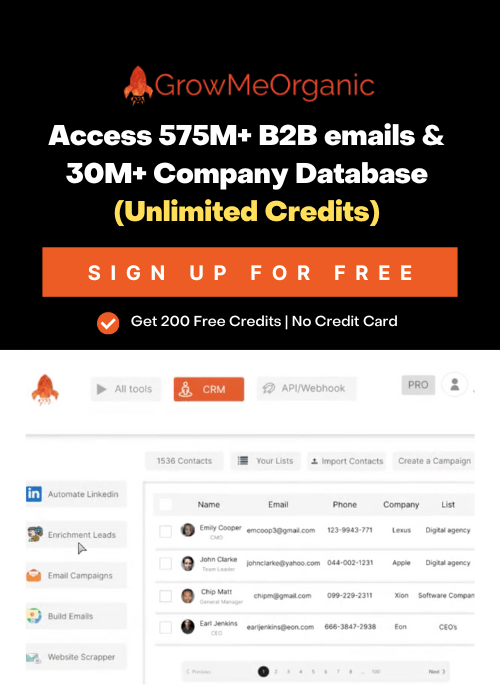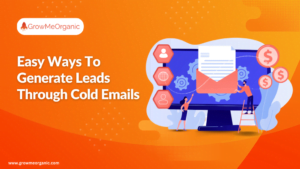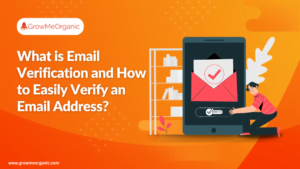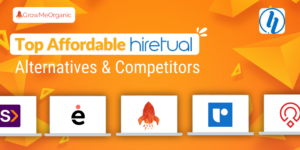GrowMeOrganic and MailChimp automate email campaigns but differ significantly in functionality and focus.
MailChimp is ideal for newsletters, while GrowMeOrganic offers distinct tools. This piece aims to clarify the differences without promoting one over the other.
With automation tools like GrowMeOrganic and MailChimp, businesses can streamline outreach and make email campaigns more targeted and impactful.
I will explore key factors like deliverability, contact list curation, analytics, and unique features to help you choose GrowMeOrganic or MailChimp for cold email.
GrowMeOrganic vs MailChimp
| Feature | GrowMeOrganic | MailChimp |
| Purpose | Sales automation for cold outreach | Email marketing automation for newsletters |
| Email Sending | From the user’s server | From shared servers |
| Cold Email Support | Supported | Not recommended |
| Email Scheduling | Human-like intervals | Bulk send at scheduled time |
| Contact Database | 575M+ contacts available | Requires pre-existing contact list |
| Email Segmentation | Simple filters and criteria | Complex logic-based conditions |
| AI Features | No | Advanced AI tools for optimization |
| Web Scraping | Built-in Chrome extension | Not available |
| Analytics | Google Analytics integration | Advanced in-app analytics with AI insights |
| Integrations | CRM integrations | CRM, e-commerce, and social media tools |
| Security | Dedicated server, private IPs | Shared servers, risk of shared IP issues |
| Compliance | GDPR-compliant | GDPR-compliant |
| Free Plan | No free plan, free trial available | Free plan with limited features |
| Customer Support | Email support | 24/7 email and chat support |
| Mobile App | Not available | Fully functional mobile app |
| Pricing | Flat fee for unlimited contacts | Tiered pricing based on subscriber count |
GrowMeOrganic Vs Mailchimp: Email Deliverability and Server Reputation
MailChimp sends all emails through its servers, and as a large company, it operates multiple servers optimized to handle massive volumes of email daily.
MailChimp divides its users into groups to manage this, each sharing a server. When you use MailChimp, you’re sharing a server with numerous other companies and individuals.
This setup significantly impacts email deliverability.
To land your emails directly in recipients’ inboxes, you need an excellent reputation with both Internet Service Providers (ISPs) and Email Service Providers (ESPs).
If you spam recipients, ISPs, ESPs, and even the recipients themselves will flag you, damaging your reputation.
Once your reputation is ruined, your deliverability takes a major hit. Your emails will bypass inboxes and head straight to spam, where they’ll remain unseen and unread.
Now, imagine sharing a server with thousands of users whose email practices you know nothing about. If some of them are spammers, ISPs and ESPs will blacklist the server.
Unfortunately, your reputation gets dragged down, as you’re on the same server. This shared environment can severely harm your deliverability.
GrowMeOrganic stands out by sending emails from dedicated servers, which ensures better deliverability and protects your reputation.
GrowMeOrganic Vs Mailchimp: Mass Mail Sending Behavior
All emails are sent simultaneously when you schedule your newsletter through MailChimp or similar platforms.
For example, if you schedule a newsletter for 2,000 recipients at 10 a.m., the entire batch is blasted out at that exact time. Essentially, it’s mass emailing in one big push.
If you’re wondering what’s wrong with this, consider whether a human could send thousands of emails at once.
Obviously not.
ISPs are highly attuned to this kind of “robotic” behavior because it mimics spamming. As a result, they flag such activities which negatively impact your deliverability. ISPs aim to discourage mass emails by flagging them as spam.
That said, MailChimp and similar platforms work tirelessly to maintain the reputation of their servers. However, spammers on shared servers make this an ongoing challenge.
GrowMeOrganic takes a different approach by automating email outreach to mimic human-like behavior.
This reduces the chances of being flagged as spam and ensures better deliverability, making it a smarter choice for email campaigns.
GrowMeOrganic Vs Mailchimp: AI-Powered Content
While both platforms leverage AI for personalization and optimization, Mailchimp provides a broader, more advanced set of features. These include AI-generated emails, predictive sending, content recommendations, and advanced A/B testing, among others.
GrowMeOrganic focuses on personalization, spam elimination, and rekindling customer interest but lacks the range and depth of Mailchimp’s capabilities.
Mailchimp’s extensive AI features help marketers save time, create impactful campaigns, and make data-driven decisions, whereas GrowMeOrganic offers more basic tools suited for simpler needs.
Mailchimp offers AI-powered tools like
- Creative Assistant
- Content Optimizer
- Send-Day and Time Optimization
- Predictive Segmentation
- Product Recommendations
These features streamline workflows, enhance campaign effectiveness, and support smarter marketing decisions. In contrast, GrowMeOrganic doesn’t have an AI assistant for email marketing.
Instead, it provides a library of email templates for manual personalization tailored to segmented B2B contact lists.
From Creative Assistant and Content Optimizer to Send-Day and Time Optimization, Predictive Segmentation, and Product Recommendations, these tools help you save time, improve your campaigns, and make smarter marketing decisions.
On the contrary, GrowMeOrganic only does not have an AI assistant for email marketing. It offers an archive of email templates to personalize email content for a segmented B2B contact list manually.
GrowMeOrganic Vs Mailchimp: Contact List Curation
GrowMeOrganic surpasses Mailchimp when it comes to building B2B contact lists. For new businesses, GrowMeOrganic provides access to a database of over 575 million contacts, which can be refined by industry, location, company size, and other parameters.
Users can create an ideal customer profile (ICP) to generate a tailored contact list and start email campaigns quickly.
Also, GrowMeOrganic allows users to discover emails from Google, local business websites, B2B companies, and LinkedIn. The platform also includes email verification tools to minimize bounce rates.
In contrast, Mailchimp functions purely as an email marketing platform, requiring users to supply a contact list to begin their campaigns.
| Feature | GrowMeOrganic | Mailchimp |
| Contact Import | CSV files, LinkedIn search results | CSV, TXT files, connected apps, manual entry |
| Data Validation | No clear protocols | Robust validation, email verification, duplicate removal, error reports |
| List Management Automation | Automated bulk exports, email drip campaigns, lead scoring, follow-ups | Customer journey builders, predictive segmentation, tag-based automation |
| Integration Options | LinkedIn, Google My Business, SMTP servers, marketing tools (API/webhooks) | E-commerce platforms, social media, CRMs, marketing automation tools |
| Import Undo | Not available | Available for recent imports |
GrowMeOrganic Vs Mailchimp: Email Segmentation
You’ll find that both GrowMeOrganic and Mailchimp excel in this area, though they take different approaches. With Mailchimp, you can access advanced segmentation features to create highly targeted campaigns.
Predictive segmentation uses machine learning to forecast subscriber behavior, and e-commerce integration allows for product-based segmentation.
You can set your parameters to create and interact with a segmented email list accordingly. I found the process a little complex for beginners.
You can also use pre-built templates or define custom filters based on activity, purchase history, or demographics. However, you might find the platform complex if you’re a beginner, and the cost increases significantly as your list grows.
GrowMeOrganic offers a simpler, more intuitive segmentation process tailored for small businesses and startups like yours. It focuses on organic growth, letting you segment by demographics, behavior, and engagement.
You can create custom segments with dynamic filters, update real-time lists based on interactions, and trigger emails with automated workflows.
Its integration capabilities and relationship-building focus make it a great option if you’re looking for an all-in-one solution.
If you prioritize simplicity and integrated tools, GrowMeOrganic could be the best fit. For more advanced segmentation and analytics, Mailchimp may be the right choice for your needs.
GrowMeOrganic Vs Mailchimp: Actionable Analytics
MailChimp uses AI to provide actionable analytics for your email marketing campaigns, offering insights that identify pitfalls and highlight high-performing sections to guide smarter decisions.
Its 50+ behavior-based triggers enable personalized email campaigns, while its comprehensive reports help you take decisive action. Similarly, GrowMeOrganic integrates with Google Analytics to track email campaigns.
Mailchimp provides comprehensive features, including advanced visualization, customized reporting, intelligence-backed tools, and predictive segmentation.
Conversely, GrowMeOrganic focuses on lead scoring, email warm-up, and campaign scheduling—critical aspects of email marketing. Our real-time data enrichment and verified capabilities ensure lead data accuracy and relevance.
GrowMeOrganic Vs Mailchimp: Web Scraper Chrome Extension
You can use GrowMeOrganic’s Chrome extension to simplify web scraping for emails, phone numbers, and other details. Easily install it in your browser to save hours searching for contact information.
It helps you extract data from business websites, forums, and LinkedIn, with unlimited credits to gather information from business domains.
| “I’ve been using GrowMeOrganic. Their LinkedIn Scraper is excellent. Also other powerful B2B and B2C scraping tools on their app. You could get a free trial of Sales Navigator for a month, pay for 1 month of GrowMe at $99, scrape a few thousand emails, validate them, and upload to your CRM. Cancel GrowMe while you work through the leads.” |
MailChimp doesn’t provide a convenient extension for web scraping. You’ll need to manually find and collect email IDs for decision-makers or points of contact (POCs).
Now it’s decision time—which tool should you choose?
While both platforms share similar features, they differ primarily in user interface and usability.
Why Should You Use GrowMeOrganic for Your Email Outreach?
MailChimp only charges subscriptions as an email-sending platform. On the contrary, GrowMeOrganic offers a huge contact database, predesigned filters to create custom email lists, and a web scraper tool.
For human-like emailing features without AI-driven mechanical templates, GrowMeOrganic is a good choice to go with.
You can create a new campaign and instantly start working on it with its built-in template builder.
You can use GrowMeOrganic to send a maximum of unlimited emails (keeping the daily limits of your email server in mind) per day per email account.
Now comes the best part:
GrowMeOrganic sends your campaigns using your own email provider, Gmail, Outlook, Yahoo, etc., and your server. So, there is no sharing IPs and servers with others who could hurt your reputation. This will tremendously improve your deliverability.
Take a sneak peek of how you can connect any email server with GrowMeOrganic:
Also, GrowMeOrganic doesn’t send all the emails from your campaign at once.
If you schedule a particular campaign with 1,000 emails for 10 a.m., our algorithms will ensure that human behavior is mimicked by sending a couple of emails every few minutes.
This way, you won’t raise any red flags with your ISP, and it will also improve your deliverability.
Also, timing plays an important role when it comes to email outreach. The system takes into consideration the time zone of every single recipient. It makes sure that they receive your email during their office hours.
Long story short, GrowMeOrganic uses your server to send out your campaigns and sends and delivers them as if a human has manually clicked the send button.
MailChimp is a sound GrowMeOrganic alternative for cold email outreach without email list curation.
Why wait?
Explore the email outreach features of GrowMeOrganic. Sign up for a 14-day free trial and decide.
FAQs
1. Can I Integrate Growmeorganic Or Mailchimp With My CRM?
Yes, both tools offer integrations with popular CRM platforms. GrowMeOrganic integrates with tools like HubSpot and Salesforce to help manage leads efficiently. MailChimp also integrates seamlessly with CRM tools to enhance your marketing automation.
2. What is MailChimp used for?
MailChimp is an email marketing platform used for creating, managing, and automating newsletters, campaigns, and audience engagement, ideal for businesses seeking structured, permission-based communication strategies.
3. What Type Of Businesses Benefit Most From Growmeorganic?
GrowMeOrganic is ideal for businesses focused on cold outreach, such as B2B startups, sales teams, and agencies looking to scale lead generation. It’s particularly beneficial for companies with a strong emphasis on personalized email campaigns.
4. Can I Manage Multiple Accounts With These Tools?
GrowMeOrganic allows you to manage multiple email accounts, making it great for outreach campaigns across different domains. MailChimp is primarily designed for single-domain campaigns, but you can create multiple audiences under one account.
5. Do These Tools Support Mobile Apps?
MailChimp has a mobile app that lets you create, send, and track campaigns on the go. GrowMeOrganic does not currently offer a dedicated mobile app but is accessible through web browsers on mobile devices.
About Post Author
Anant Gupta
Growth Hacker, Marketing Automation Enthusiast & Founder of GrowMeOrganic







